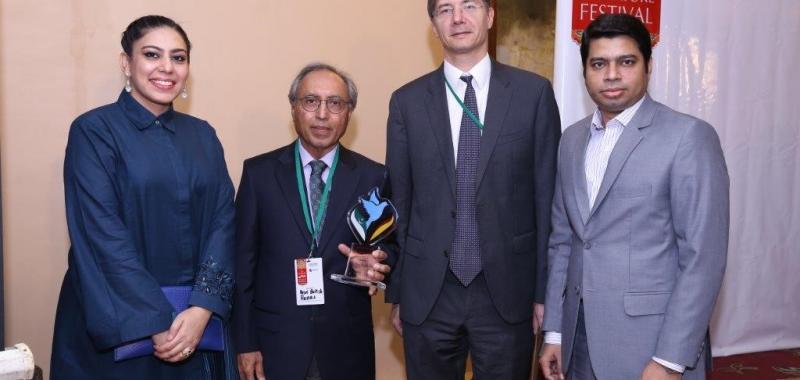
Imagining Pakistan: Modernism, State and the Politics of Islamic Revival (Lexington Books, 2017) by Dr. Rasul Bakhsh Rais (Professor of Political Science at the Department of Humanities and Social Sciences, Mushtaq Ahmad Gurmani School of Humanities and Social Sciences) recently won two prestigious awards at the 9th Karachi Literature Festival (KLF) held from February 9 to 11, 2018. The book won the KLF Non-Fiction Best Book Award, 2018 and the KLF Best Book German Peace Award, 2018. The former is awarded to the best book in English in the non-fiction category and the latter recognises contributions to the causes of tolerance, peace, and harmony.
Imagining Pakistan offers a fresh insight into the perils that beset Pakistan at the time of independence. It is based on thorough research and explores competing visions of Pakistan. Rais points out that the vision of the founder of Pakistan was essentially that of a democratic and pluralistic state but it was subsequently clouded by military intervention and a narrow self-serving interpretation of Islam.
Here is the citation for the awards:
“We all have our own perception of what may be termed as the crisis of Pakistan. And some aspects of it are easily grasped. But for a deeper understanding of what has gone wrong we can greatly benefit from this well-researched study about Pakistan by one of our prominent social scientists, Rasul Bakhsh Rais.
“His ‘Imagining Pakistan’ stands out for a number of reasons. In the first place, he offers hope that we can meet the challenge of radical Islam and prescribes specific measures to reform the Pakistani state and build a ‘moderate, tolerant and pluralistic society’.
“Essentially, he has argued that “the creation of Pakistan was a result of Muslim modernism that greatly shaped an epic struggle for identity, nationalism and empowerment of the Muslim communities”. At the same time, he agrees that resistance from the Islamists had emerged in the early years though “the real threat to political modernism came from the military”.
“Rasul Bakhsh Rais engages us in a conversation on Pakistan in holistic sense, using lenses of history, sociology, politics, and humanities. The book is a verification of the fact that the author has been writing and teaching about Pakistan at the university level for more than four decades.
“While he underlines the need to explore how Pakistan’s identity has become conflictive, he also believes that mere resilience of the society or the use of military means to defeat terrorism may not be enough. We must re-engage with the founding ideas of political modernity. He also argues that Islam and modernity are not really conflictive.
“He has examined why Pakistan has not lived up to the liberal vision and promise of its founders and how long decades of misrule, civilian and military authoritarianism and the mafia-like organized corruption within the ruling political groups and state institutions have undermined the democratic faith of the ordinary citizens.
“As for the enduring problems of the state, Rasul Bakhsh Rais has three indicators: Military intervention; Failure of the political class to provide leadership; and Political violence, including religious extremism and ethnic conflict.
“We can see that Pakistan represents conflicting and confusing trends of chaos and order, of pessimism and optimism, of corruption and integrity. But there is hope. “Pakistan’s gradual takeover by a coalition of bureaucratic-military establishment and feudal oligarchy has begun to provoke an intellectual, social and political reaction from the middle-class and civil society”.”


